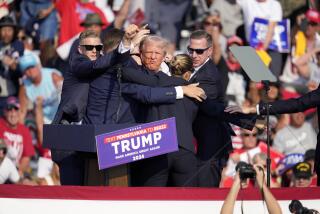COLUMN LEFT/ ALEXANDER COCKBURN : An Attack as American as Apple Pie : Clinton’s rationale for striking Iraq is hypocritical, with deep roots in U.S. ‘state terrorism.’
- Share via
This time it was Clinton, but it could just as well have been Bush or Reagan.
“From the first days of our Revolution,” said President Bill with grave and solemn mien, “America’s security has depended on the clarity of this message: Don’t tread on us.”
Bill Clinton’s next sentence is the one they ought to keep on file and save future speech writers the effort of dressing up the same old thoughts in new clothes.
“A firm and commensurate response,” Clinton told Americans in the wake of last weekend’s bombardment of Baghdad, “was essential to protect our sovereignty, to send a message to those who engage in state-sponsored terrorism, to deter further violence against our people and to affirm the expectation of civilized behavior among nations.”
Thus were justified the 23 Tomahawk missiles hurled at Baghdad from U.S. ships in the Persian Gulf and the Red Sea because there are supposed Iraqi agents of Saddam Hussein now facing trial in Kuwait for seeking to assassinate former President Bush when he visited Kuwait earlier this year.
International legal experts are scoffing at the United States’ invocation of the “self-defense” Article 51 of the U.N. Charter.
By the same token, assuming that the allegations of the plot against Bush are true, Saddam Hussein could argue that his was “a firm and commensurate response” in retaliation for the “state-sponsored terrorism” of the U.S. Navy commander who, acting under orders in the waning days of the Bush presidency, launched a cruise missile into the Rashid Hotel in Baghdad, killing two receptionists.
At the time of that attack, an Islamic conference was being held in the Rashid, which Saddam Hussein was expected to attend. Leaving aside Bush’s parting shot at the Rashid, the United States certainly did its best to kill Hussein during the 1991 war. By some accounts, up to a third of all U.S. air sorties were at one point devoted to the task of trying to nail the Iraqi leader.
Aside from these attempts by missile or bomb, it was openly conceded by U.S. intelligence and military chieftains that, after the war ended in March, 1991, anti-Saddam Hussein strategy would consist of trying to sponsor his assassination. So Saddam could reasonably claim that an attempt on Bush in Kuwait was merely a belated effort to even up the score.
There’s no evidence that Libya’s leader, Moammar Kadafi, ever tried to organize the assassination of Ronald Reagan, but by Clinton’s moral logic he too would have been on sound grounds in making such an attempt. In 1986, after all, President Reagan had tried to assassinate him.
In April, 1986, again claiming self-defense under Article 51 of the U.N. Charter, Reagan launched nine F-111s against Kadafi’s compound in Tripoli. One bomb killed Kadafi’s young daughter.
Reagan and his commanders were confident of the assassination bid. The Washington Post reported at the time that the White House had prepared a statement for Reagan before the raid, anticipating Kadafi’s death and asserting it had not been planned.
No one could raise more raucous laughs about American presidents moralizing about “state-sponsored terrorism” and “the expectation of civilized behavior” than Fidel Castro, who has faced many attempts to assassinate him by the U.S. government, starting in the Kennedy Administration.
A more successful effort by President John F. Kennedy was the assassination of the Vietnamese leader Ngo Dinh Diem, who perished with his brother on Nov. 1, 1963. Cabinet minutes earlier in 1963 show Kennedy calling for actions that would “maximize the chances of the rebel generals.” After the coup took place and Diem was dead, Kennedy wired the local organizer of the coup, U.S. Ambassador Henry Cabot Lodge, praising him for his “fine job” and “leadership” and saying it was an “achievement of the greatest importance.”
It is intended as no slight on Richard Nixon to exempt him from this roll call of great moments in the homicidal history of America. There is powerful evidence that orders for the overthrow (certainly) and assassination (inferential) of Chile’s President Salvador Allende came out of the White House of Nixon and his security adviser Henry Kissinger.
Next time America discharges bombs or missiles on their punitive missions, the commander in chief should avoid high-minded language about “state-sponsored terrorism” and “civilized behavior” and stick simply to the basic message, “don’t tread on me,” ever the murderous snarl of the biggest bully on the block.
More to Read
Sign up for Essential California
The most important California stories and recommendations in your inbox every morning.
You may occasionally receive promotional content from the Los Angeles Times.













